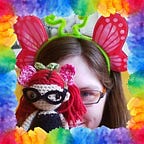International Day of People with Disabilities 2019
When I first became disabled with ME/CFS, I didn’t have a connection to the disabled community.
I didn’t want one, either. I googled fibromyalgia support groups not long after I was diagnosed and everything I found made me want to run away. These groups were all full of older women who seemed to have given up on life.* All they did was complain. They reminded me of my grandmother, who’s been sick my entire life, and whose only response to my illness was “well, it’s not as bad as MINE.” When I think of them, all I remember is the colour grey.
When I first arrived in San Francisco, I tried attending a local ME/CFS support group. I was the only person there under 50. I sat as a sobbing woman told us that she was EMF sensitive, and she’d heard that salt helped, but she didn’t know whether to put it on her phone, or on herself. So she put it in a bowl and kind of, you know, wafted it around. She was clearly in distress, but it was worlds away from what I was going through. When I talked about my young, comparatively active life, and how hard I struggled to maintain it, there was a distinct whiff of judgement in the room. I had the same illness as them, but it was clear nobody felt I belonged.
So I thought the disability community wasn’t for me. And to be honest, I was scared by what I encountered. I didn’t want to become a person marinating in grief. I wanted to maintain my hope. Like most people raised abled, I hadn’t had enough exposure to disabled people to know that it wasn’t all grief. And there was another factor: I accepted myself as disabled, but after that support group, I didn’t see a place where I fit in. In other words, I thought I wasn’t disabled “enough”. That I was better off clinging to the healthy, normal** connections I already had. And of course, I was outstandingly wrong.
But slowly, without me even being aware of it, the disabled community began to envelope me. I had a meltdown at an #MEAction protest and it was two famous activists, sick and fighting to be there themselves, who took me somewhere quiet and calmed me down. After that, I started to take more of an interest in the ME movement. I began, in the smallest of ways, advocating for my people. And not long after I became bedbound, I went looking for online ME support groups as a way to pass the time. This time, I found one that fit me.*** One that accepted me without judgment; one that offered comfort, and humour, and hope. Now I spend every waking minute immersed in my community. I talk to way more disabled people than abled people. And I am healthy and normal as everyone around me.
It took becoming bedbound with ME for me to find my community. But it didn’t stop with ME. I didn’t want to advocate for some of us when I could advocate for all of us. Reclaiming my autism diagnosis only spurred me on further. The fact is, I have been disabled since birth. I have always been “disabled enough”. I started researching the wider disability community, the issues affecting other groups. I became aware of #DisabilityTwitter and fierce activists like @Imani_Barbarin, @dominickevans and Alice Wong (@SFdirewolf). I learned that every accommodation, or access, or right I have is because of disabled people who fought before me. I am lying down exhaustedly on the shoulders of giants. But it is so much better than lying down alone.
This International Day of People with Disabilities, I want to encourage you to connect with the disabled community. We are a hard, soft, strong, weak, bright, exciting people. We have been places and seen shit. And our voices deserve to be heard. As someone who was raised outside it and inducted later in life, I can’t express the impact the disability community has had on me. They have taught me so much — not just about disability, but about humanity. They have cultivated a righteous rage and a deep empathy in me. Now, of course, I understand why those women complained. And I know why that woman at the support group cried. I wish I’d shown more solidarity before, when I had the capacity to put it into action. The sit-down comedian @KarLeia recently tweeted: “The greatest and most reliable resource for disabled people is other disabled people.” Today I want to commit to being the best resource for disabled people I can be. Maybe it’s something we can all do together.
*With a healthy rest break afterwards.
**Of course, later I would realise none of my connections are healthy and normal.
***I knew this because the first thing they did was send me stickers of cute cartoon dicks.
